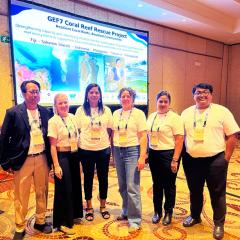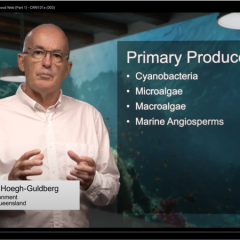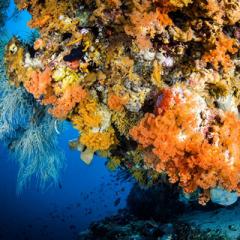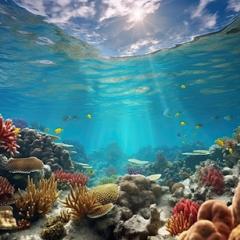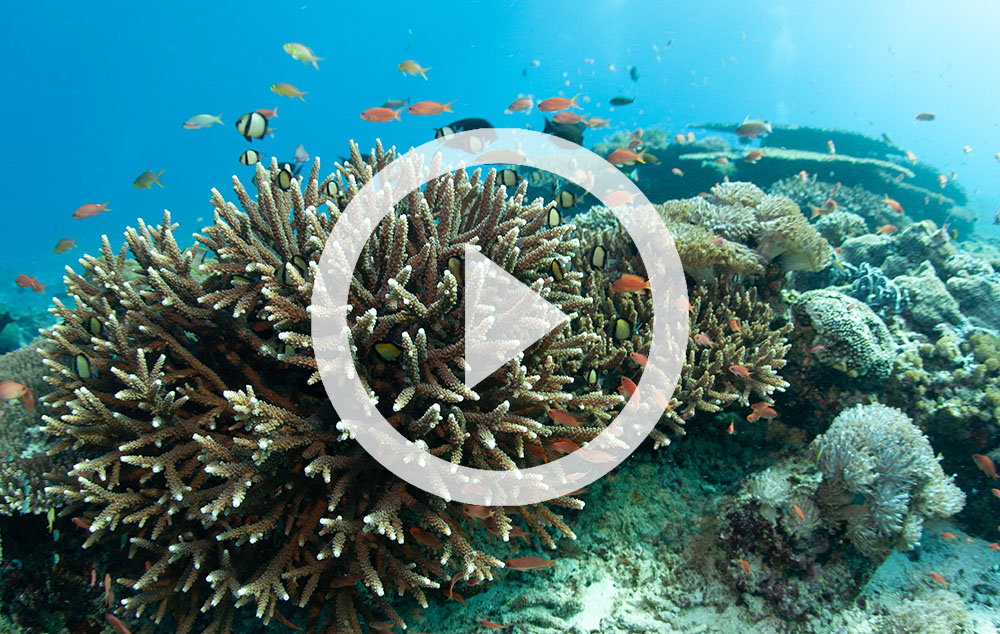Safeguarding globally significant climate refuge reefs.
Worldwide coral reef ecosystems are in crisis. The global pressure of climate change along with local human induced pressures are contributing to the rapid deterioration of coral reefs ecosystems - jeopardising the lives of the millions of people that rely on these coastal resources. The GEF7 Coral Reef Rescue (CRR): Resilient Coral Reefs, Resilient Communities Project is working to safeguard globally significant climate refuge reefs in six countries - Fiji, Solomon Islands, Indonesia, Philippines, Madagascar and Tanzania.
The Global Environment Facility (GEF) is a family of funds dedicated to confronting biodiversity loss, climate change, pollution, and strains on land and ocean health. Its grants, blended financing, and policy support help developing countries address their biggest environmental priorities and adhere to international environmental conventions. Over the past three decades, the GEF has provided more than $23 billion and mobilized $129 billion in co-financing for more than 5,000 national and regional projects.

The GEF7 Coral Reef Rescue project is a multistakeholder project implemented through the World Wildlife Fund (WWF GEF Agency). The project execution team is led by The University of Queensland in partnership with project country Focal National Government Ministries and National Technical Partners.
Objective: To build capacity and solutions to ensure the long-term survival of climate-resilient coral reef ecosystems, thereby supporting the blue economies and communities dependent on these reefs.
The core components of the project are:
- promote global to local knowledge and capacity strengthening for climate refuge reef conservation;
- establish inclusive governance and planning processes addressing local threats to coral refuge reefs;
- support the alignment of co-finance and mobilization of investment opportunities that support coral refuge reef conservation; and
- facilitate communication and awareness of the significance of climate refuge reefs to ensure their survival.
Implementing Agency: WWF-GEF
Executing Agencies:
- The University of Queensland: International Development (Project Management Unit); School of Environment
- Focal National Government Ministries: Fiji Ministry of Environment, Solomon Islands Ministry of Environment, Climate Change, Disaster Management and Meteorology; Indonesia Ministry of Marine Affairs and Fisheries; Philippines Department of Environment and Natural Resources and Tanzania Ministry of Livestock and Fisheries.
- National Technical Partners: Wildlife Conservation Society (Fiji, Solomon Islands and Madagascar); Reef Check Indonesia, Palawan Council for Sustainable Development (Philippines) and the Marine Parks and Reserve Unit (Tanzania).
Coral Reef Rescue Initiative Partners:
- Arizona State University’s Center for Global Discovery and Conservation Science
- Blue Ventures
- CARE
- Rare
- The University of Queensland
- Wildlife Conservation Society
- World Wildlife Fund
A global analysis led by The University of Queensland identified a portfolio of coral reefs that have lower exposure to climate change stress due to local oceanographic conditions such as currents and upwelling. Approximately 80% of these climate refuge reefs are found in developing countries and ~70% of these reefs are concentrated in just 7 countries: Cuba, Fiji, Solomon Islands, Indonesia, Philippines, Madagascar, and Tanzania.
Despite being less exposed to climate change, all climate refuge reefs are facing decline and loss of resilience due to increasing local pressures. Given their importance as a source of reef regeneration in a ‘climate stabilised world’, a global multistakeholder partnership the Coral Reef Rescue Initiative (CRRI) was formed to focus efforts and investments on protecting these globally significant climate refuge reefs.
The GEF7 Coral Reef Rescue: Resilient Coral Reefs, Resilient Communities Project contributes to the CRRI by building capacity and solutions that ensure the long-term survival of climate refuge coral reef ecosystems in 6 of these 7 countries: Philippines, Solomon Islands, Fiji, Indonesia, Tanzania, and Madagascar.
Project-specific Grievance Redress Mechanism
Project-affected communities and other interested stakeholders may raise a grievance at any time to the Coral Reef Rescue Project Management Unit.
If you should need to file a grievance, contact the:
Project Management Unit, University of Queensland International Development at:
Email: pmu.crri@uq.edu.au
Mailing Address:
Project Management Unit
GEF Coral Reef Rescue Project
International Development
The University of Queensland
St Lucia, Queensland, 4072
Australia.
Complaints may be submitted in the Affected Party’s native language and should include the following information:
- Complainant’s name and contact information (if not filed directly by the complainant, proof that those representing the affected people have authority to do so);
- The harm that is or may be resulting from the project;
- The relevant Environmental and Social Safeguards policy or provision (if known);
- Any other relevant information or documents;
- Any actions taken so far to resolve the problem;
- Proposed solutions; and
- Whether confidentiality is requested (stating reasons).
The PMU will respond within 10 business days of receipt, and claims will be filed and included in project monitoring.
WWF GEF Agency Grievance Mechanism
In addition to the project-specific grievance redress mechanism, a complainant can submit a grievance to the WWF GEF Agency. A grievance can be filed with the Project Complaints Officer (PCO), a WWF staff member fully independent from the Project Team, who is responsible for the WWF Accountability and Grievance Mechanism and who can be reached at:
Email: SafeguardsComplaint@wwfus.org
Mailing address:
Project Complaints Officer Safeguards Complaints, World Wildlife Fund
1250 24th Street NW
Washington, DC 20037
Stakeholders may also submit a complaint online through an independent third-party platform.
GEF Secretariat Conflict Resolution Commissioner
GEF Policy also establishes the position of GEF Conflict Resolution Commissioner in the GEF Secretariat and a person concerned about a GEF-financed project may submit a complaint to the GEF Resolution Commissioner. Complaints submitted to the Commissioner should be in writing and can be in any language. The complaint should provide a general description of the nature of the concerns, the type of harm that may result, and (where relevant) the GEF-funded projects or program at issue.
A complaint can be filed by email or letter to:
Mr Peter Lallas
GEF Conflict Resolution Commissioner
E-mail: plallas@thegef.org
Mailing Address:
Mr Peter Lallas
Global Environment Facility The World Bank Group, MSN
N8-800 1818 H Street, NW
Washington, DC 20433-002
Online learning courses
Free edX courses are now available for enrolment via the Coral Reef Rescue website.
Enrol in 'Coral Reefs: Introduction to Challenges and Solutions' and 'Sustainable Blue Economy' to learn more about our coral reef ecosystems and the challenges they face.
Project document
View the WWF GEF project document to learn more about the project scope, background, environmental significance and more.
View the project document
Photo: © Ove Hoegh-Guldberg, The University of Queensland


